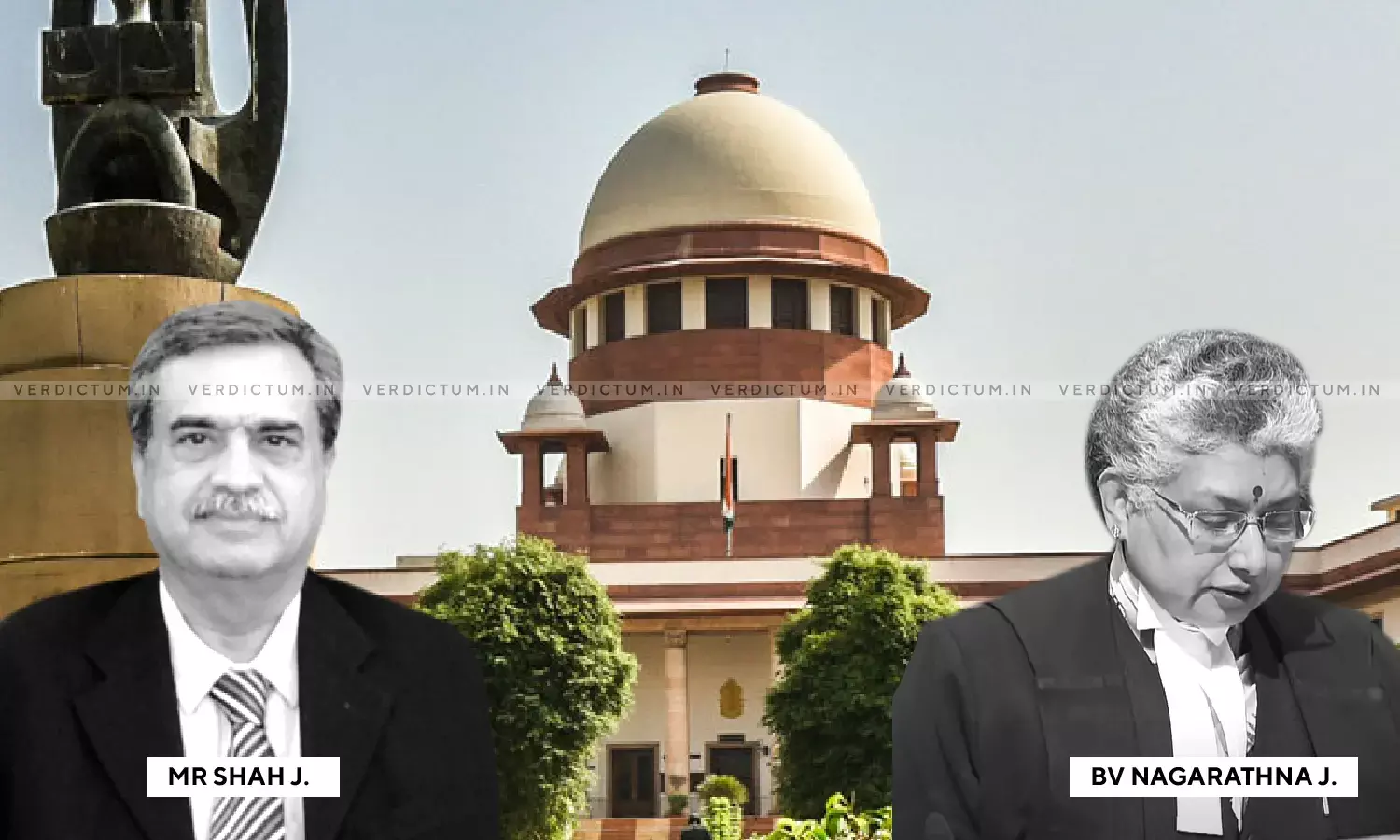Granting 100% Reservation To One Class Violative Of Constitution – SC Quashes Jharkhand's Decision To Grant 100% Job Quota To Locals
The Supreme Court on Tuesday quashed the State of Jharkhand's decision to grant 100% quota to the locals of the scheduled districts for government jobs thereby excluding those belonging to non scheduled districts to apply for the post.
The two-judge Bench of Justice MR Shah and Justice BV Nagarthna while upholding the impugned judgment of the Jharkhand High Court observed –
"…it is ultimately observed and held that the reservation that is permissible by protective mode, by making it 100 percent would become discriminatory and impermissible. It is further observed and held that the opportunity of public employment cannot be denied unjustly to the incumbents, and it is not the prerogative of a few. The citizens have equal rights, and the total exclusion of others by creating an opportunity for one class is not contemplated by the founding fathers of the Constitution of India."
In this case, batch of appeals were preferred before the Apex Court assailing the impugned judgment of the High Court which had declared Notification No. 5938 and Order No. 5939 dated 14.07.2016 issued by the State of Jharkhand and Advertisement No. 21 of 2016 dated 28.12.2016 modified by the Advertisement No.21 of 2016 published on 04.12.2017, by the State Government through Department of Personnel, Administrative Reforms and Rajbhasha inviting application for appointment to the posts of Trained Graduate Teacher in the Government Secondary Schools to the extent of making 100% reservation for the local candidates / residents of Thirteen Scheduled Areas in the State of Jharkhand as illegal, ultra vires and unconstitutional and consequently has quashed the appointments of the Trained Graduate Teachers made pursuant to the advertisement.
Pursuant to the Presidential notification 13 districts in the State of Jharkhand were declared as Scheduled Areas. The notification was issued in exercise of powers conferred by the sub paragraph (2) of paragraph 6 of the Fifth Schedule to the Constitution.
Only the local residents of concerned Districts only were deemed eligible for appointment in the vacant post of District Level Class III and Class IV in 13 notified Districts out of 24 Districts of the State and appointment of people from other Districts/ other States was not permissible in those Districts. It was made clear that the candidate belonging to the Nonscheduled Districts cannot participate in the process of selection in the Scheduled Districts.
Candidates belonging to the nonscheduled districts who were prevented from making application for the vacancy in the Scheduled Districts, preferred Writ Petition challenging the constitutional validity of the notification and order passed by the State Government.
The Division Bench of the High Court had referred the matter to a Larger Bench and by the same order the High Court stayed further implementation and operation of the impugned notification and order subject to the appointments, if already made.
The original Writ Petitioners had alleged that the notification issued in exercise of the powers conferred in para 5(i) of the Fifth Schedule of the Constitution violative of Articles of 14 & 16 of the Constitution, including Article 13(2) and 16 (2).
Further, it was also contended that in the garb of the non obstante clause in para 5(i) of the Fifth Schedule of the Constitution, the Governor cannot infringe and or affect the fundamental rights under Part III of the Constitution and that there cannot be 100% reservation, so as to make only the residents of a particular area to be eligible for appointment to a public post.
Heavy reliance was placed by the Petitioners on various precedents of the Apex Court including Chebrolu Leela Prasad Rao & Ors. Vs. State of A.P. & Ors reported in (2021) 11 SCC 401.
While the State as well as the successful candidates contended that the Notification making 100% reservation for local residents of the Scheduled Areas was / is absolutely within the scope, ambit and powers of the Governor in exercise of para 5 of the Fifth Schedule to the Constitution of India.
Following the decision of the Apex Court in the case of Chebrolu Leela Prasad Rao & Ors (supra), the High Court had declared the aforesaid Notification and aforesaid advertisement unconstitutional and / or ultra vires, to the extent of making 100% reservation for the local residents of the Scheduled Areas.
The High Court had also held that Notification and the Order are violative of Article 16(3) and 35(a) of the Constitution, as such powers are vested with the Parliament and not with the State Legislature, thereby quashing the advertisement.
The High Court also quashed the appointments of the Trained Graduate Teachers in the Scheduled Districts and directed that all the post 8423 posts be advertised afresh and fresh selection process be undertaken in accordance with law.
Senior Advocates Rajeev Dhavan, Vikas Singh, R. Venkataramani, Vibha Datta appeared for the successful candidates belonging to Scheduled Areas, Senior Advocates Kapil Sibal and Sunil Kumar appeared for the State of Jharkhand, Senior Advocates Ranjit Kumar and Gopal Sankaranarayanan appeared for the Respondents – Original writ petitioners belonging to non-scheduled districts and Senior Advocates Ajit Kumar Sinha, Colin Gonsalves and Pallav Shishodia appeared for other respective parties and interveners.
The issues that were dealt with by the Court were –
- Whether in exercise of powers conferred under paragraph 5(1) of the Fifth Schedule to the Constitution of India, whether, the Governor can provide for 100% reservation contrary to Part III of the Constitution of India, more particularly, guaranteed under Article 16(1) and (2) ?
- Whether in exercise of powers under paragraph 5(1) of the Fifth Schedule to the Constitution of India the Governor has the power to modify the relevant Recruitment Rules framed under Article 309 of the Constitution of India?
- What Order?
For answering the aforesaid issues, the Apex Court referred to Articles 13, 16, 46, 244, 246, 254, 309 and Para 5 of the Fifth Schedule of the Constitution which states the law applicable to Scheduled Areas.
The Court then placed reliance on of Chebrolu Leela Prasad Rao & Ors (supra) and after taking into consideration the relevant provisions of the Constitution, held that the Governor's power to make new law is not available in view of the clear language of Para 5(1) Fifth Schedule does not recognize or confer such power, but only power is not to apply the law or to apply it with exceptions or modifications. (para 51)
Further, the Bench observed –
"It is observed and held that the power of Governor under Para 5(1) of Schedule V of the Constitution is restricted to modifying or not to apply, Acts of the Parliament or Legislature of the State. Thus, Rules could not have been amended in the exercise of the powers conferred under Para 5(1) of the Schedule V. It is further observed and held that the Rules made under the proviso to Article 309 of the Constitution cannot be said to be an enactment by the State Legislature. (paras 52 to 57)."
While placing reliance on a catena of judgments, the Court held that the power conferred on the Governor to deal with the scheduled areas is not meant to prevail over the Constitution. The power of the Governor is pari passu with the legislative power of Parliament and the State. The legislative power can be exercised by the Parliament or the State subject to the provisions of Part III of the Constitution.
The Court also held that the non obstante clause contained in Para 5 (1) of the Fifth Schedule of the Constitution shall be read with respect to power of the Governor to suspend and/or modify the law made by the Parliament. It cannot be read as conferring upon the Governor absolute power and/or unfettered power, notwithstanding the provisions contained in Part III of the Constitution.
While answering question no.2 viz. whether 100% reservation is permissible under the Constitution -
The Bench after referring to and / or considering various decisions of this Court on 100% reservation and after considering Articles 14, 15 and 16 and other relevant Constitutional provisions and after taking into consideration of the decision the Apex Court in Indira Sawheny & Ors. v. Union of India & Ors., it is ultimately observed and held that the reservation that is permissible by protective mode, by making it 100 percent would become discriminatory and impermissible.
The Court thus opined –
Applying law laid down by the Constitution Bench of this Court in the case of Chebrolu Leela Prasad Rao (supra), to the facts of the case on hand, the impugned Order/ Notification No.5938 and the Order No.5939 dated 14.07.2016 providing 100% reservation for the local residents of concerned Scheduled Districts/ Areas only can be said to be –
i) Beyond the scope and ambit of powers conferred upon the Governor under para 5(1) of the Fifth Schedule of the Constitution of India;
ii) 100% reservation provided for the local residents of the concerned Scheduled Districts / Areas only would be violative of Article 16(2) of the Constitution of India and affecting rights of the other candidates / citizens of nonscheduled areas / Districts guaranteed under Part III of the Constitution of India;
iii) The exercise of powers by the Governor under para 5(1) of the Fifth Schedule of the Constitution of India modifying Recruitment Rules, 2015 which are framed under Article 309 of the Constitution of India which can be said to be subordinate legislation and cannot be said to be an Act or the Law made by the Parliament and / or State Legislature is beyond the scope and ambit of Governor's power under para 5(1) of the Fifth Schedule of the Constitution of India.
The Court also noted that selected candidates are already working since last about three years, in case appointments already made are not protected then thousands of schools in the State of Jharkhand would be without teachers and the ultimate sufferers would be the children of tribal areas, thus the Bench held –
"Hence, we are of the opinion that while moulding the relief, instead of initiating a fresh recruitment process, if directions are issued for preparation of fresh selection list based on revised merit and based on already published cut off obtained by the last selected candidate in each TGT subject against respective categories."
In the light of these observations, the Court upheld the order of the High Court declaring the impugned Notification/Order dated 14.07.2016 as unconstitutional and ultra vires Articles 14, 16(2), 16(3) and 35(ai) of the Constitution of India and dismissed the appeals challenging the impugned judgment of the High Court.
Cause Title - Satyajit Kumar & Ors. v. The State of Jharkhand & Ors













